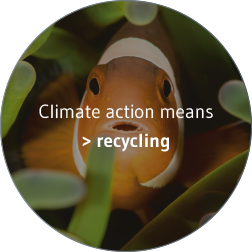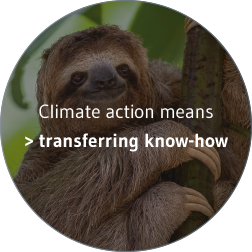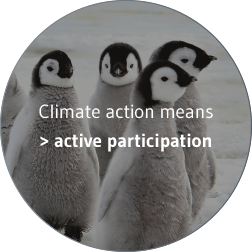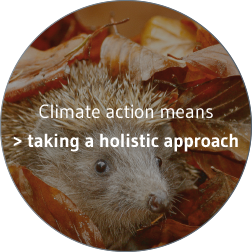Summer’s here at last!
„We’ve all noticed that there’s been an increase in the number of extreme weather events – for example, the devastating droughts and floods. This has already had a catastrophic impact on harvests in the Global South. Which is why every effort must be made to limit global warming to a maximum 1.5°C. For example, by switching to renewable energy.“
Maximilian

Thermal treatment: the mainstay of the energy transition
Another essential contribution that the circular economy makes towards curbing climate change besides recycling is producing renewable energy. By thermally treating residual substances that cannot be recycled for reuse, we are able to generate climate-friendly electricity, district heat and process steam with practically no fossil fuels having to be used during the process.


Put in concrete figures: 24.1 million tonnes of municipal, industrial and commercial waste were transformed into 32 million megawatt hours of electricity in Germany in 2019.1 Which means CO2 savings of 13.5 million tonnes compared to the same amount of energy produced from fossil fuels. The same amount of CO2 emitted by the whole of Lithuania.2
What’s more, thermal waste treatment plants have a steady energy output and provide the necessary continuity of supply, offsetting any fluctuations in the power generated by wind and solar energy systems.3 Two key reasons, therefore, why thermal treatment is so valuable for curbing climate change.

Look into the tiger’s eye. And take a long, hard look at your conscience. We can only guess at the number of beautiful animals and plants that have been lost as a result of man-made climate change. Each victim is one too many. So it’s probably not a bad thing if you feel as if this white tiger is giving you a reproachful look.
So what will the future bring?
Ever more efficient plants and ever more CO2 savings
Of course, we can and we must ask ourselves the question: are thermal waste treatment plants the future and must it not be our goal to recycle preferably everything so that it can be reused? The answer is: yes, it must and indeed it is. However, despite the great efforts and large investments being made by the circular economy (see examples in transfer of know-how) it will never be possible to do away completely with thermal treatment. There will always be substances that cannot be recycled for reuse.

Which means our goal must be: to use thermal treatment only when necessary and, if it must be used, then as efficiently as possible.
By the way, this also means preparing non-recyclable materials in a safe and environmentally compatible way so they can be sent for thermal treatment – materials that would otherwise have to be disposed of as hazardous waste because of their potentially harmful properties. Just one example of this can be found at our state-of-the-art REKOMED facility for treating infectious healthcare waste. The incoming material is sterilised here in a safe and environmentally friendly way so that it can be passed on for thermal treatment. One thing is certain: the importance of thermal treatment in the battle against climate change will continue to grow.
A study Energieerzeugung aus Abfällen (PDF) [The production of energy from waste] commissioned by the Federal Environment Agency (German)
Phosphorus recovery – for future-proof resource policies and a positive climate footprint
Did you know that sewage treatment plants are no longer simply places for treating wastewater? They also recover clean water, energy and valuable raw materials. The most valuable substance of all in fact. The ash produced from incinerating sewage sludge contains phosphorus, a raw material that is essential for all forms of life. And we recover this substance using a patented system.

If the phosphorus were to be recovered from all volumes of sewage sludge produced in Germany, then this would have the same effect on reducing CO2 levels as 27 million trees – the equivalent of a forest area ten times the size of Central Park.
We are currently operating the world's first ever industrial-scale phosphorus recovery plant in Hamburg, which is able to produce 7,000 tonnes of ultrapure phosphorus from 20,000 tonnes of sewage sludge ash. But this is just the beginning; the potential – also looking at the aspect of curbing climate change – is enormous.

Generating biogas – recycling par excellence
Besides our thermal treatment operations, we also recycle biomass. Why? Because our mission to protect our climate means making the very most of all types of waste. Indeed, the way we close this material lifecycle couldn’t be more circular. Being a waste management logistics provider, we carry out kerbside collections for our customers. We use the contents of the organic waste bins to produce both compost and biogas – a climate-friendly fuel that is then used to power our refuse collection vehicles. These vehicles have 90% fewer carbon emissions than trucks run on fossil fuels. This means that we not only help to reduce the emissions of the energy industry but of the transport sector as well.
Find out all about compost

Lorries run on biogas: 90% fewer CO2 emissions

Here at the REMONDIS Group, we also generate biogas as part of our wastewater treatment operations. These activities alone enable us to save the same amount of CO2 emitted by the vehicles of 10,000 commuters.
Biodiesel that has no impact on food production or the environment
Animal fats are a further example of how our holistic approach and high recycling expectations help curb climate change. We use animal fats – a residual product generated by the rendering plant – to produce biodiesel. Unlike plant-based biodiesel, our operations cause absolutely no collateral damage: no raw materials are used that could be turned into food and no arable land is appropriated that could be used for growing food crops.

And our biodiesel is most certainly a climate-friendly fuel. Indeed, the Institute for Energy and Environmental Research (IFEU) in Heidelberg has certified that its climate footprint is 85% better than that of fossil fuel5. It will also play an important role as we transition towards e-mobility.
This role could, in fact, be even greater if German politicians followed the example of other European countries and put biodiesel made from animal fat on an equal footing with biodiesel made from vegetable fat – and by doing so confirm the role it can play in tackling climate change. As long as this is not the case, there is no incentive for the mineral oil industry to buy biodiesel based on animal fat. It is the climate that is losing out here.
Our goal is to take action ourselves to curb climate change as well as to get others to join in
1 These figures are valid for the waste treatment plants organised within the ITAD (Association of thermal waste treatment plants in Germany
2 laenderdaten.info
3 Faulstich: Perspektiven der thermischen Abfallbehandlung – Roadmap 2040 [The future prospects of thermal waste treatment – 2040 road map], 2020
4 Federal Environment Agency: Energieerzeugung aus Abfällen [The production of energy from waste], 2018
5 Institute for Energy and Environmental Research (IFEU): press information about the environmental footprint study, 2015 (German)














